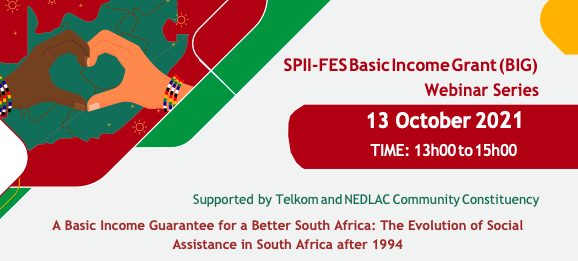SPII-FES Basic Income Grant (BIG) Webinar Series (1/3)


South Africa is a country characterised by gross poverty, inequality, and destitution. Unemployment is at an all-time high with a rate of 44.4%. With the COVID-19 pandemic wreaking havoc in all spheres of South African life over the past two years, our society’s fault-lines have been exposed for all to clearly see. Working age people lack access to social assistance, and there are no policies that have been put forward to address people’s needs and stimulate economic growth and inclusive pathways into work, despite many headline commitments. This is cause for a Basic Income Grant.
Instead, National Treasury regularly repeats its commitment to austerity budget principles. Little cognisance seems to exist for the greater destitution occasioned by the disruption of the Covid- 19 Pandemic, beyond the reluctant reintroduction of the R350 Social Relief of Distress Grant until March 2022. It is in this context that the Studies in Poverty and Inequality Institute (SPII) has intensified the longstanding call for the implementation of a Upper Poverty Line indexed universal Basic Income Guarantee (BIG) in South Africa.
The BIG is both a humanitarian, social assistance measure and an economic stimulus with a potential to transform the socio-economic landscape of our country by ensuring the economic inclusion of the majority of South Africans whilst providing them with basic security. In 2021, with the support of the Friedrich-Ebert-Stiftung (FES), SPII has commissioned three critical papers on the BIG with the purpose of informing and advancing evidence-based research, policy, and social dialogue on the implementation of a BIG in South Africa. These papers form the basis of the FES-SPII BIG Webinar series and will deliver evidence-based insights on the following webinar topics to advance public understanding of the key findings:
Source: YouTube